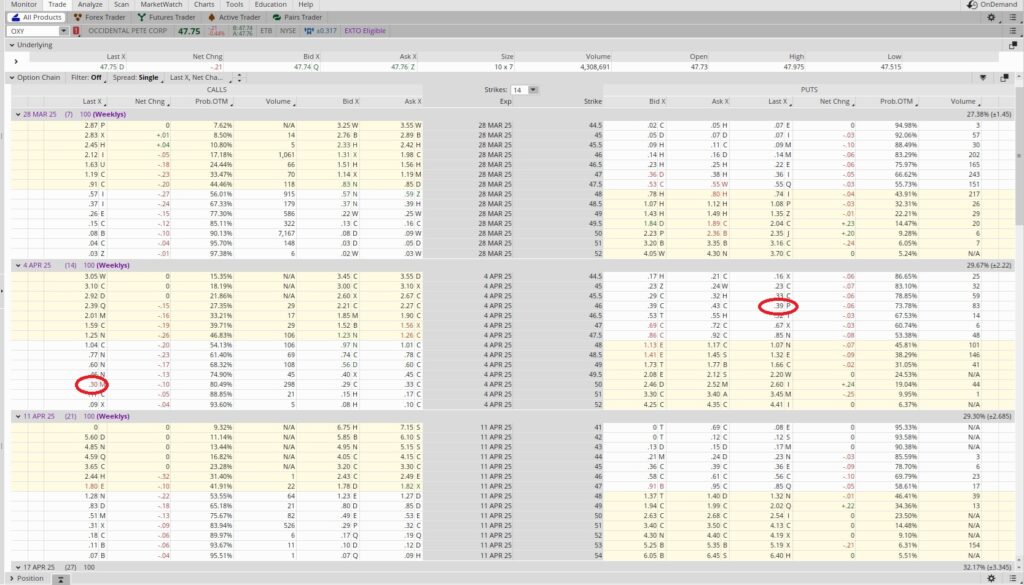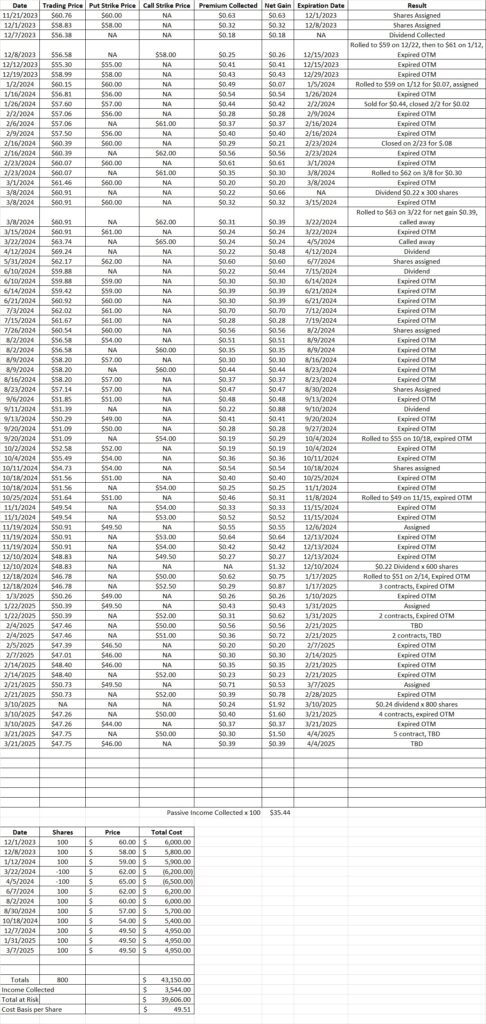Basic Options Trade
Today we’re walking through a basic options trade to generate passive income with options. Lately we’ve been doing wheel trades on OXY. We currently own 800 shares of OXY in this portfolio and we’ve worked our basis down to $49.74 per share. We’ve been selling options on OXY as our weekly option trade and also collecting the dividends. Today we had four contracts of the covered call at the $50 strike expire out of the money. We also had one contract of the cash secured put option at the $44 strike expire worthless out of the money. We collected premium on both of those trades and used it to reduce our basis. Now we’re going to do a similar trade.
Since our cost basis is $49.74 per share we can sell a covered call at the $50 strike or higher. If OXY runs up through our call strike and our shares are called away we’ll make money on both the premium from selling to open the contract as well as the gain on the share price. Ideally we’ll sell the covered call, collect the premium for passive income, and the trading price for OXY will stay below $50 so we can keep our shares and repeat the process at expiration.
We can see the $50 call strike for the 4/4 expiration date is $0.30. We sold to open four of the those covered call option contracts. This basic options trade requires us to hold our 100 shares of OXY for each call option contract we sell. We’re obligating ourselves to sell these shares at $50 on or before 4/4. With OXY trading at $47.75 we’re happy to promise to sell our shares for $50, and to get paid to make that promise. With 800 shares in our portfolio we’re selling to open 5 contracts. That means we’re obligating ourselves to sell 500 shares of OXY at $50 on or before the 4/4 expiration date. We brought in $0.30 per share in passive income with this basic options trade. Since we did five contracts, that works out to $150. We’re happy to let some shares go above our cost basis.
We’re also selling to open a cash secured put option to generate passive income. When we sell to open a put option we’re obligating ourselves to buy shares of the company at the strike price on or before the expiration date. So we need to be sure that it fits our valuation of the company before we enter the put option. We also want the premium we receive for entering the contract to give us an acceptable return on the capital we’re risking by entering the contract.
In this case we’re selling to open the $46 put option strike for the 4/4 expiration date. That gave us $0.39 in passive income per share, or $39 total on the $4,600 we’re putting up for the trade. We’re happy to risk $4,600 to make $39 because the worst that can happen here is that we are assigned shares of the company at $46 per share. We’re happy to buy shares of OXY at $46, so we might as well get paid to do it. Now we’ll walk through how we evaluate this trade.

This trade is two weeks long. Since there are 52 weeks in a year, in theory we could do this trade 26 times per year. So our time multiplier is 26. The premium is $0.39 per share and our strike price is $46. So we divide the $0.39 in premium by the $46 strike price and we get 0.0085. Then we multiply that by 26 (our time multiplier) and we get 0.22. That’s an annualized return of 22% on the capital we’re risking by selling to open this put option contract. We’re happy with a 22% annualize return, so we’re going ahead with this trade. Here’s the tool we use to calculate the return on our option contract.
When we sell to open a cash secured put option and a covered call option with different strike prices but the same expiration date it’s known as an option strangle. Since we’re selling to open these contracts it’s a ‘short strangle’. If these trades go against us we can buy to close the contracts to avoid assignment.
Basic Options Trade Recap
We sold to open the $50 covered call for the 4/4 expiration date for $0.30 in premium. Since our cost basis is $49.74 per share we’re happy to sell some of our shares at the $50 strike. We also sold to open the $46 cash secured put option for the 4/4 expiration date. That brought in $0.39 per share in passive income. We did five contracts on the covered call side of the trade and one contract on the put side. These basic options trades bring our basis down to $49.51 per share.

